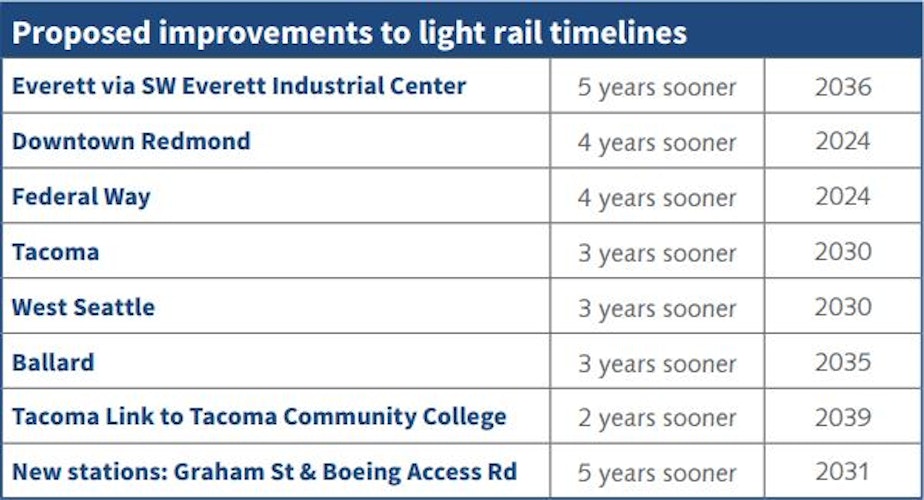Sound Transit shaves 2-5 years off decades-long wait for light rail

Everett could get light rail in 20 years instead of 25 under a new plan discussed by the Sound Transit board Thursday afternoon.
Light rail would reach Ballard in 19 years instead of 22.
The plan would also shave four years off the long waits for service in south King County and on the Eastside.
"We heard loud and clear from everybody that they want more, faster,” Snohomish County Executive and Sound Transit board member Dave Somers said. “That’s as true in the north part of the Sound Transit district as it is in others."
“There is an insatiable appetite for more service quicker,” Vicky Baxter with the Renton Chamber of Commerce said.
Skeptics maintain the agency could feed that appetite more cheaply and quickly by investing less in light rail and more in bus rapid transit. About 85 percent of the proposed transit package would be spent on light rail.
Housing or parking?
Sound Transit also has to decide what to do with land around any future rail stations: put up parking garages or provide affordable housing.
Community organizer Hodan Hassan with Got Green said gentrification around light rail stations has forced many poor people to leave the Rainier Valley in South Seattle.
"Increasing our supply of permanently affordable housing near transit will help our community stem the tide of displacement," she told the Sound Transit board. She called for the agency to prioritize selling its surplus land for affordable housing development.
“If you want to get people out of their cars and using regional transit, you have to give them reasonable access to transit,” Janet Quinn of Kenmore and the 522 Transit Now! Coalition said. “And for the suburbs, that means parking.”
Arlington Mayor Pro Tem Debora Nelson said millennials have a different relation to cars than older generations. “The future workforce do not want to own or drive cars,” she said. “They would much rather use transit to not only get to work but to also go shopping and to their other personal needs.”
The latest version of the regional transit proposal adds $4 billion to the $50 billion cost the agency announced earlier.
Sound Transit spokesperson Geoff Patrick said the increase would not add to the annual burden of sales taxes, property taxes and license fees that residents would shoulder, which the agency estimates at $200 per adult. He said the agency would likely have to extend how many years those taxes would last before being rolled back.
Patrick said the agency could cover the extra $4 billion cost by issuing more bonds.
The Sound Transit board is expected to finalize the package of rail and bus projects next month and send it to voters in King, Pierce and Snohomish counties in November.

